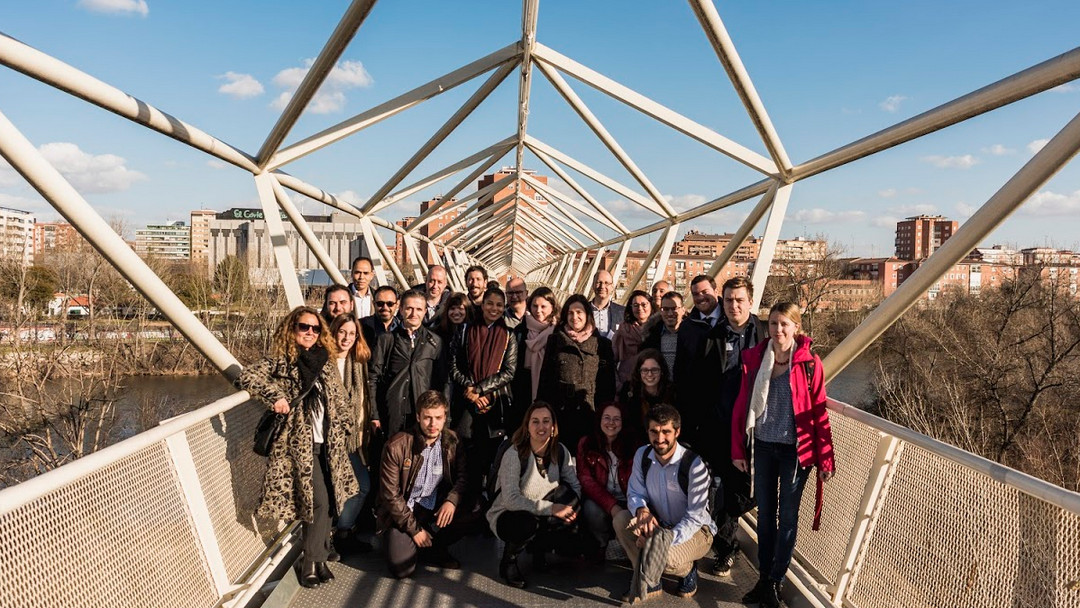The Horizon 2020 funded project celebrated its Final Conference in Valladolid, Spain on 20th February 2019. Project partners presented the achievements of the project and the ultimate solution for the energy efficient retrofitting design at district level.
The OptEEmAL project is bringing a new vision for the EeB sector! After three years and a half of intense work, the OptEEmAL consortium is proud to present an Optimised Energy Efficient Design Platform for refurbishment at district level, able to design energy efficient retrofitting projects that are based on different energy conservation measures to improve the performance of a district.
Participants discovered the multiple benefits the OptEEmAL Platform can bring to the design of retrofitting measures at the project’s final conference in Valladolid, Spain. On 20th February 2019, the OptEEmAL project partners presented the great technological achievements of the project, the challenges they overcame and an outlook of what can further be done to revolutionise the energy retrofitting sector. During the conference, the OptEEmAL Platform was presented and the audience was guided through the different steps of the platform. The conference was concluded with a site visit to the Cuatro de Marzo district in Valladolid where retrofitting actions, in the context of R2CITIES project, coordinated by CARTIF, have led to a reduction in energy consumption of over 50%. This provided the basis for the demonstration of the performance of the OptEEmAL Platform. Also, the project’s final booklet was handed over to the participants, offering an excellent overview about project objectives and the different modules of the OptEEmAL Platform.
Besides the presentation of the partners’ achievements in this project and the relevance of the OptEEmAL Platform for the design of retrofitting actions, exciting keynote speeches rounded off the event: about the next steps towards decarbonising the building stock by a representative of the Green Building Council and an approach to nearly zero energy retrofitted buildings presented by Energiesprong UK.
The event offered a great opportunity for city representatives and public authorities, urban planners, architects and experts from the energy and construction sectors to exchange on energy efficient retrofitting topics.
With the Optimised Energy Efficient Design Platform, the OptEEmAL consortium has created a tool able to reduce time delivery and uncertainties resulting in improved solutions when compared to business-as-usual practices. Using this tool, the main output of the project has been to demonstrate and validate the correct functioning of the platform for three demonstration districts located inSan Sebastián (Spain), Lund (Sweden) and Trento (Italy).
‘OptEEmAL can be a very useful tool to identify the most relevant retrofitting scenarios for the main districts of the city of San Sebastián, addressing the requirements and barriers of each district and the interests of all stakeholders involved in the retrofitting projects’, says Iker Martinez, Fomento de San Sebastián, Spain, OptEEmAL demo site.
‘The OptEEmAL project has drawn attention to the possibilities BIM offers. It has also shown how important it is to have a holistic approach to energy efficiency measures in which multiple actors. This project has received funding from the European Union’s Horizon 2020 research and innovation programme under grant agreement No 680676. interests must be balanced’, concluded Elin Dalaryd from the City of Lund, Sweden, OptEEmAL demo site.
And Micol Mattedi from Habitech representing the OptEEmAL demo site in Trento, Italy confirmed: ‘The OptEEmAL Platform turns out to be a really useful and innovative tool: it combines different aspects in one single solution and, after recovering and adding multiple and differentiated data, is able to provide effective and valid refurbishment energy efficiency scenarios, which help the owner of the buildings to evaluate and take more weighted decisions’. The OptEEmAL Platform provides the user with a holistic tool aimed at reducing time and costs in the design phase, and improving the whole process in terms of management, information flows and design quality.
‘Capturing the reality of retrofitting a district is a big challenge in terms of modeling and solving in a semi-automatic manner, a problem that requires multiple interactions between data, stakeholders and tools. To address this challenge appropriately, different and complementary knowledge fields have been integrated resulting in a tool that supports the retrofitting design process and that allows for the reduction of time, errors and costs for stakeholders’, said OptEEmAL Project Coordinator Miguel García Fuentes from CARTIF Technology Centre, Spain.
‘We have seen an incredible knowledge generation and transformation of this knowledge into a real product in three and a half years. The use of BIM models for retrofitting projects in an “automated” manner is a great breakthrough and offers new possibilities in the building sector. OptEEmAL has brought web technologies knowledge and their application to retrofitting projects to a new level’, emphasised Maxime Pousse from NOBATEK, France, responsible for environmental simulation, platform validation and demonstration on technical and societal levels within OptEEmAL.
The OptEEmAL project has an important economic impact that is reflected by a reduction of costs during the design phase by about 19% compared to business-as-usual, and the operational phase cost could be reduced by 25% through promoting holistic solutions, leading to a Return on Investment (RoI) increase of over 50%. This makes the OptEEmAL Platform a great tool to design energy efficient retrofitting projects. If you are interested to discover the tool in more detail, please watch our new video on the OptEEmAL Platform and let yourself be guided through its different steps.

